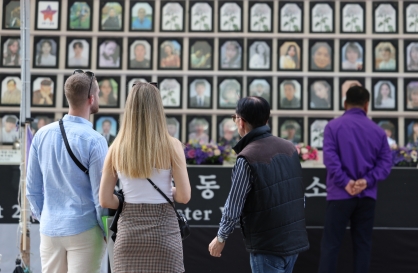New EU chamber weighs money and image
Chairman focuses on trust, efficiency to gain support
By Korea HeraldPublished : Dec. 17, 2012 - 20:24
The European Chamber of Commerce in Korea, which has embraced a brand new identity as a nonprofit group after suffering a string of corruption scandals that marred the previous leadership, appears to be pondering over how to make money while maintaining a spotless public image.
“It’s all a matter of financing,” said Thilo Halter, chairman of the new ECCK.
He said the chamber still has the option of going full-profit, but that the decision depended on how well the chamber gets back on its feet.
The ECCK was born from the ashes of the former European Union Chamber of Commerce and Industry in Korea, or EUCCK, which was fined this year for tax evasion and other corruption.
In the ensuing media circus, the chamber saw its 800-plus membership dwindle, but more importantly, it forfeited their trust. Halter is now tasked with winning it back, from both the members and the Korean community.
“It’s all a matter of financing,” said Thilo Halter, chairman of the new ECCK.
He said the chamber still has the option of going full-profit, but that the decision depended on how well the chamber gets back on its feet.
The ECCK was born from the ashes of the former European Union Chamber of Commerce and Industry in Korea, or EUCCK, which was fined this year for tax evasion and other corruption.
In the ensuing media circus, the chamber saw its 800-plus membership dwindle, but more importantly, it forfeited their trust. Halter is now tasked with winning it back, from both the members and the Korean community.

“We need to become a professional organization to be respected,” Halter said. But he added that even a professional organization needs to be financed, “somehow.”
This is why it’s so important that the chamber enlists the support of all European countries: to show that the group represents the entire region’s operation in Korea, according to the new chairman.
Listening to what they have to say, and helping guide the way to transparency and sound management, will therefore be his key priorities.
On Dec. 7, the ECCK members elected Halter, the chief executive of MAN Truck & Bus Korea, to take the helm of their newly formed organization.
Halter was enthusiastic about his new part-time job, but knows he’s in for some tough times.
Trust building is a tall order for any organization, especially when it has no binding authority, either legally or morally.
“At the end of the day, we are elected by our members. We are an organization that needs the justification and support of our members. I think the board is not in a position to tell our members what to do,” Halter said.
He remained upbeat, however, betting that the members will communicate closely with the chamber board, especially when the board has a policy of asking everything in advance.
Coordination will be particularly critical for the new chamber leadership, as it must stay aligned with not only the Korean government and companies, but also other local chambers representing respective countries, such as the United Kingdom, Germany and France.
“We must be efficient. Chasing the same thing, and not being coordinated, it does not make sense. We need to be coordinated to maximize ourselves,” Halter said.
Despite the risk of inefficiency, he advocated the local chambers, which he considered to be vital for handling issues that concern the respective nations and not necessarily Europe as a whole.
For any foreign company, Korea is both a difficult yet awarding place to do business in, the new chairman said, because of its incessant demands for high quality ― in both product quality and services.
Hence, Korea has the reputation of being the world’s most challenging pilot market.
As a businessman, the chamber’s new chairman considered the family-owned businesses of Korea to be something uniquely Korean that contributed hugely to the nation’s much-talked-about rags-to-riches turnaround following the Korean War.
“I dare say it would not have been possible for Korea to grow so fast, and to be world market leaders in so many industries, if there had not been the concerted actions of family-owned businesses,” he opined.
Public companies such as MAN Truck may be the better set up for Europeans, although as Halter pointed out, there are plenty of family-owned businesses in Europe that are doing a fine job, even amid economic woes in the eurozone.
“Many world market leaders are family owned. So there must be something right in the setup,” he remarked.
Halter stressed that the way organizations are structured strongly depends on the environment they operate in, meaning that what is best for Europe may not be the case for Asia, and vice versa.
By Kim Ji-hyun (jemmie@heraldcorp.com)
-
Articles by Korea Herald





![[Music in drama] Rekindle a love that slipped through your fingers](http://res.heraldm.com/phpwas/restmb_idxmake.php?idx=644&simg=/content/image/2024/05/01/20240501050484_0.jpg&u=20240501151646)


![[New faces of Assembly] Architect behind ‘audacious initiative’ believes in denuclearized North Korea](http://res.heraldm.com/phpwas/restmb_idxmake.php?idx=644&simg=/content/image/2024/05/01/20240501050627_0.jpg&u=20240502093000)










